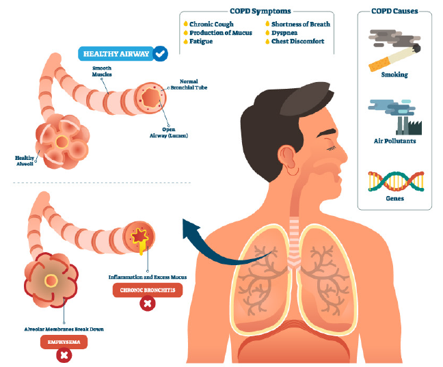Principal Investigator:
Ronald Crystal, Professor and Chair of Genetic Medicine
Summary
- Chronic obstructive pulmonary disease (COPD) refers to a group of diseases that cause airflow blockage and breathing-related problems (See Figure 1)
- In 2019, COPD was the 3rd largest worldwide cause of death and was responsible for > 3 million deaths
- COPD develops gradually over time, often resulting from tobacco exposure from active smoking or passive exposure to secondhand smoke
- Treatment options are limited and include: bronchodilators, inhaled steroids, and PDE4 inhibitors
- Dr. Crystal, a world leading pioneering authority in the gene therapy space, is developing a novel precision medicine platform to identify causes of smoking induced COPD, and the effects of mitochondrial dysfunction in the development of COPD
Technical Overview
- Dr. Crystal and his team are leading a collaborative effort to identify novel drug targets for COPD
- The team is using in vitro and murine smoking models to focus on mitochondrial dysfunction in the lungs of COPD patients
- Dr. Crystal is also studying COPD pathogenesis using bronchoscopic brushing of small airway epithelium of non-smokers, smokers and COPD patients using a unique and extensive biobank of COPD and control samples of airway epithelial stem and progenitor cells in order to identify therapeutic targets
- The team plans to develop an in vitro phenotypic assay to determine the effects of cigarette smoke on cells and then interrogate potential targets
Market Opportunity
- COPD was the 3rd largest worldwide cause of death in 2019 and was responsible for > 3 million deaths
- In the United States, the estimated direct costs of COPD are $32 billion
- With no effective treatment, costs are predicted to increase further
- The team are working to develop a precision medicine platform to identify novel causes of smoking induced COPD, and the effects of mitochondrial dysfunction in the development of COPD
- This platform will also enable the identification of biomarkers of disease across various patient groups that could be a potentially used as a tool for diagnostics and for measuring disease progression
Partnering Opportunity
Weill Cornell Medicine is seeking an industrial partner with deep domain expertise and a presence in the COPD and respiratory space aimed at the development of novel COPD therapeutics

Figure 1: Pathology of COPD.
Resources
Contact Information

For additional information please contact
Brian Kelly
Director, Business Development and Licensing
Phone: (646) 962-7041
Email: bjk44@cornell.edu

